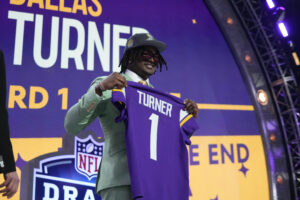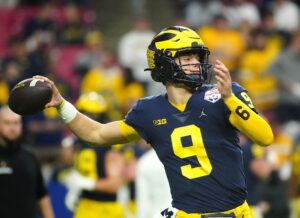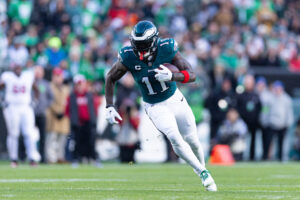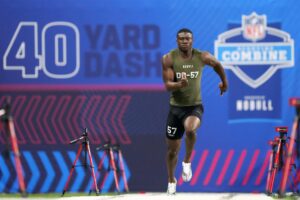Welcome back to the Ranking Tom Brady’s Seasons Series. Last week, we covered the worst four years of Brady’s storied career. In the second week of the series, we enter the ninth through 12th best seasons of his career. A reminder, this isn’t to say any of Brady’s seasons have been bad, just that some have been better than others.
Ranking Tom Brady’s Seasons: 9-12
Number 12: The 2005 season
Stats: 63.0 percent completion percentage, 4,110 yards, 26 touchdowns, 14 interceptions
Season result: 10-6, lost in AFC Divisional Round to Denver Broncos
Remember when 4,110 yards was enough to lead the league in passing? After winning three out of four Super Bowls, this team finally slowed down from that torrid pace of winning. Running back Corey Dillon didn’t have as much in the tank as in 2004, and the defense started to show its age.
Make no mistake, this was still a good team. The 10-6 record accurately reflects what type of a group they had that season. Patriots fans have become spoiled over the years, but it’s incredibly difficult to win ten games in the National Football League.
Part of the reason Patriots fans aren’t used to winning “only” ten games is that Brady has pushed ten win talent teams to 13, 14 wins. He wasn’t able to do that in 2005. His 26:14 interception ratio was below his usual standards, and he ended his season with a bad game.
After tearing apart an overmatched Jacksonville Jaguars team, Brady lost the first playoff game of his career. Travelling to Denver, which would end up becoming the closest thing to his kryptonite, Brady completed just 56 percent of his passes, throwing one touchdown and two interceptions.
It was his first interception that truly cost the game. Trailing 10-6 with the ball in the red zone, Brady threw an ugly pass off his back foot that was picked off by Broncos cornerback Champ Bailey. Bailey returned it the length of the field before getting stopped at the one-yard line by tight end Ben Watson. This was the first time Brady didn’t play his best when the lights shined brightest, and it’s what brings this season in at the number 12 ranking.
Number 11: The 2001 Season
Stats: 63.9 percent completion percentage, 2,843 yards, 18 touchdowns, 12 interceptions (13 starts)
Season Results: 11-5, won Super Bowl against St. Louis Rams
Brady wins his first Super Bowl and it doesn’t even crack the top 10. It’s surprising considering how magical that first run was, but by the time you’ve won five it’s hard for every Super Bowl season to make the top 10.
This one comes in as the lowest of his Super Bowl seasons because this was before Tom Brady became Tom Freaking Brady. Belichick and the coaches were cautious early on with the young quarterback, giving him safe reads and not asking him to win too many games on his own. His 18:12 TD:INT ratio was nothing special, and his 2,843 yards isn’t anything to write home about either.
Why 2001 Is This High
This season is when the legend of Brady truly began. In the AFC Divisional Round, the Patriots found themselves trailing 13-3 against the favored Oakland Raiders. In just two drives, Brady orchestrated a touchdown drive and a field goal drive to send the game to overtime. New England got the ball to begin overtime, and Brady made sure Oakland’s offense never saw the field.
Say what you will about the (correctly called) Tuck Rule helping Brady, but he still needed to erase a ten point deficit against a playoff team. Brady completed every pass he threw on his overtime drive, setting up kicker Adam Vinateri for the game-winning field goal.
And of course, we all know what happened in the Super Bowl. For the first 58 minutes and 39 seconds of game clock, the Patriots game plan involved minimizing Brady. They didn’t want the game to turn into a shootout because the New England offense probably couldn’t have kept up with the Greatest Show on Turf.
With 1:21 left on the clock, the Patriots threw that gameplan out the window. As announcer John Madden begged for the Patriots to play for overtime, Brady led one of the greatest drives of all time. With no timeouts and terrible field position, Brady led the Patriots down to the Ram 30, giving just enough time for Vinatieri to kick the game-winning field goal. The Patriots won their first Super Bowl, and the legend of Tom Brady was born.
Number 10: The 2003 Season
Stats: 60.2 percent completion percentage, 3,620 yards, 23 touchdowns, 12 interceptions
Season Results: 14-2, won Super Bowl against Carolina Panthers
Brady didn’t set the world on fire, but he was still pretty damn good in 2003. After a disappointing 2002, New England righted the ship in 2003. The defense was back to its old form, Antowain Smith muscled out one last good season, and Brady played efficient and mistake-free football.
While his stats don’t jump off the page, this was the season where Brady cemented his status as Captain Comeback. Brady orchestrated an astonishing seven game-winning drives in the 2003 season, including two in the playoffs. Of the regular season comebacks, the most memorable was probably the overtime victory against the Miami Dolphins. Starting at the 17-yard line, Brady threw an absolute dime to receiver Troy Brown. Brown hauled in the catch for the game-winning 82-yard touchdown.
Of course, the highlight of Brady’s season came in Super Bowl XXXVIII against the Carolina Panthers. Brady gave the Patriots two separate leads in the fourth quarter and pulled off an encore of his first Super Bowl victory just two years earlier. Facing a tie game with just over a minute on the clock, Brady drove the Patriots offense into field goal range as Vinatieri kicked home the game-winning field goal with just seconds left on the clock. Brady’s phenomenal stat line of 354 yards, three touchdowns, and an interception was enough to win him his second Super Bowl MVP award.
Why 2003 Isn’t Higher
Ultimately, this season likely would be ranked higher had the roster around Brady been worse. This team was built to win with a physical running game and a punishing defense. Because of this, Brady wasn’t slinging the ball around as much as he would do in later seasons. Any time the game was in doubt, New England would put the game on Brady’s shoulders and he would deliver. Nonetheless, this still only manages to be his tenth best season.
Number 9: The 2012 Season
Stats: 63.0 percent completion percentage, 4,827 yards, 34 touchdowns, eight interceptions
Season Results: 12-4, lost to Baltimore Ravens in AFC Championship Game
It’s easy to forget just how many great seasons were sandwiched in between the Super Bowl winning seasons of 2004 to 2014. Brady put together another season for the ages, and he had to do it with a lot of moving parts. Brandon Lloyd was in his first year with the Patriots and took a while to get on the same page with Brady. One of Aaron Hernandez or Rob Gronkowski was injured for every game except the season opener, and an unestablished Julian Edelman took some snaps away from Wes Welker.
Nonetheless, Brady kept dominating. His 34:8 touchdown to interception ratio was phenomenal, and he played some of his best football against the best competition. Brady’s finest game of the season came against the Houston Texans, who had the best record in the league at the time. Brady roasted that vaunted defense to the tune of 296 yards and four touchdowns. The next week, Brady erased a 25-point deficit against the future NFC Champion San Francisco 49ers. His defense ended up being unable to hold the tie, but the fact Brady got the Patriots back in it was nothing short of remarkable.
Why 2012 Isn’t Higher
It wasn’t a perfect season for the then 35-year old. Brady saw a lot of phantom pressure, ducking away from defenders that weren’t there and walking into a few sacks. Additionally, his final game of the year was easily his worst.
Going against Ed Reed and Ray Lewis for the final time, the Baltimore Ravens defense once again had their way against Brady. With Gronkowski missing the game with a forearm injury, Brady had no answers for the Ravens stout defense. Brady finished his night completing just 53 percent of his passes for 320 yards, one touchdown and two interceptions. Despite holding a 10-7 lead at halftime, Brady’s offense could only muster just three points in the second half. Ultimately, it was the worst way to end an otherwise great season.
We’re officially at the halfway point of this series. So far, Brady’s been to five AFC Championship games, won two Super Bowls, and led the league in passing yards and touchdowns once each. These were the worst half of his career. Keep an eye out next week when his fifth to eighth best seasons come out.






